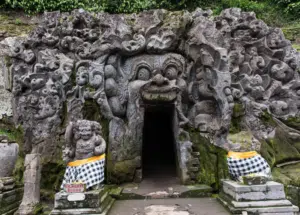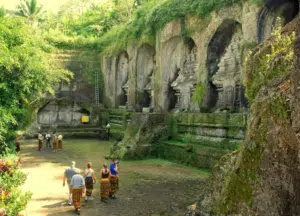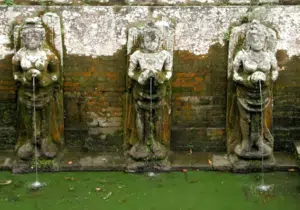Nestled amidst the lush landscapes and serene beauty of Bali lies a place of mystique and ancient wonder – Goa Gajah, or the Elephant Cave. This sacred site, shrouded in myth and history, offers visitors a glimpse into Bali’s rich cultural tapestry and spiritual heritage. From its enigmatic cave entrance to the intricately carved stone relics, Goa Gajah beckons travelers on a journey of discovery and enlightenment.
Unveiling the History
Goa Gajah is believed to date back to the 11th century, during the reign of the Balinese kingdom of Bedulu. While its exact origins remain shrouded in mystery, the site is steeped in Hindu and Buddhist influences, evident in its striking architecture and carvings. The name “Elephant Cave” is derived from the intricate stone carvings of demons and mythological creatures flanking the cave entrance, resembling elephant-like structures.
Exploring the Site
As you step through the imposing entrance of Goa Gajah, you are greeted by a tranquil courtyard adorned with ancient stone relics and lush greenery. The centerpiece of the site is the cave itself, a dark and mysterious chamber believed to have served as a sanctuary for meditation and spiritual rituals.
Inside the cave, you’ll discover a sacred lingam and yoni, symbols of divine energy and fertility, carved into the rock walls. The atmosphere is imbued with an aura of reverence and spirituality, inviting visitors to contemplate the ancient wisdom and mysticism that permeates the air.
Beyond the cave, the grounds of Goa Gajah offer further treasures to explore. Wander through the serene gardens and discover hidden shrines, cascading waterfalls, and tranquil meditation spots nestled amidst the natural beauty of the surrounding landscape.
Embracing the Spiritual Essence
For many visitors, the allure of Goa Gajah lies not only in its historical significance but also in its spiritual essence. The site remains an active place of worship for Balinese Hindus, who come to pay homage to the ancient deities and seek blessings for health, prosperity, and spiritual fulfillment.
Take a moment to participate in a traditional Balinese offering ceremony, where you can leave offerings of flowers, rice, and incense at the shrines scattered throughout the site. Immerse yourself in the sacred rituals and traditions that have been passed down through generations, and experience a profound sense of connection to the spiritual heart of Bali.
Planning Your Visit
Goa Gajah is located in the village of Bedulu, just a short drive from the cultural hub of Ubud. At the time of this writing, the site is open to visitors daily from 8:00 AM to 4:00 PM, with an entrance fee of IDR 50,000 (approximately USD 3.50).
When planning your visit to Goa Gajah, be sure to dress modestly and respectfully, covering your shoulders and knees out of deference to the site’s sacred significance. Remember to bring along plenty of water, sunscreen, and insect repellent, as the tropical climate can be hot and humid.
Contact Us for Assistance
If you’re planning a trip to Bali and wish to explore the ancient wonders of Goa Gajah, DoorToID is here to help. Our mobile app, available on both Apple and Android devices, offers a convenient way for foreigners to obtain entry permits, stay permits, and working permits for their stay in Bali.
Whether you’re seeking guidance on visa requirements, permit applications, or local regulations, our team at DoorToID is dedicated to providing personalized assistance and support every step of the way. Simply contact us at [email protected] for more information, or visit https://apps.doortoid.com to download our mobile app and begin your journey today.
Embark on a Journey of Discovery
Goa Gajah offers a glimpse into Bali’s rich cultural heritage and spiritual traditions, inviting travelers to embark on a journey of discovery and enlightenment. From its ancient cave temple to its serene gardens and sacred rituals, this hidden gem promises an unforgettable experience that will leave a lasting impression on your soul.




